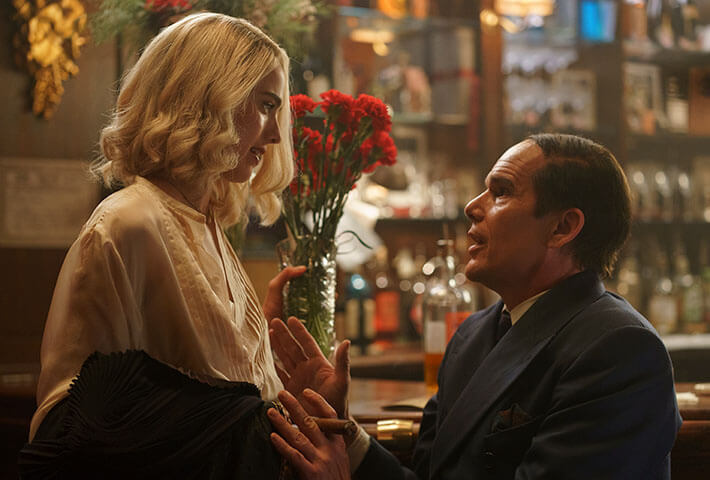Richard Linklater wants you to remember Lorenz Hart
Ethan Hawke is captivating as the tragic lyricist in ‘Blue Moon’

Margaret Qualley as Elizabeth Weiland and Ethan Hawke as Lorenz Hart in Blue Moon. Courtesy of Sony Pictures Classics
How influential was Lorenz Hart?
The diminutive lyricist penned the words to Richard Rodgers’ early oeuvre, giving voice to a moon bearing witness to a lovesick soul, the sublime imperfections of a funny valentine, the charms of a cozy flat in old Manhattan.
But in Blue Moon, Richard Linklater’s character study of the writer, Hart’s hinted to have shaped the culture beyond what’s attributed to him. He tells E.B. White about a nice “middle class mouse” named Stuart who kept invading his apartment. He advises an aspiring director named George Hill — I take it his middle name’s Roy — to tell stories about friendship rather than romance.
While these apocryphal suggestions are cute for those in the know, tragically, perhaps the most consequential thing Hart did to produce the future was die early at the age of 48. His demise, brought on by alcoholism, came shortly after Rodgers’ first success with Oscar Hammerstein II, and cleared the way for their near-exclusive collaboration and the untold riches that came with it.
Blue Moon, with an effervescent screenplay by Robert Kaplow, author of Me and Orson Welles, which Linklater adapted, is really a play on film. The most compelling reason it is a film is so Ethan Hawke as Hart needn’t navigate a stage on his knees for 90 minutes. Set almost entirely in one night at Sardi’s, in the aftermath of the 1943 premiere of Rodgers and Hammerstein’s Oklahoma! (how Hart despises that inane exclamation point), we watch Hart work a room.
He is a born schmoozer, chatting up the bartender, Eddie (Bobby Cannavale) and the young GI pianist on leave (Jonah Lees). All the while he’s bracing himself — without the aid of alcohol — to greet the arrival of Rodgers (Andrew Scott), to tell him he loved a work he deemed counterfeit (corn as high as an elephant’s eye?) and convince him to take him back.
At the same time, Hart, a semi-closeted gay man, is anticipating a rendezvous with his new muse, 20-year-old Yale student Elizabeth Weiland played by Margaret Qualley. (Hart’s correspondence with an unidentified coed named Elizabeth served as source material for the film.) The evening circles back to a theme summed up in Hart’s favorite line from Casablanca: “Nobody ever loved me that much.”
Who, Hart asks, has ever been loved half as much as they needed to be?
What makes the film so poignant is that Hart was loved, but never in the way he wanted.
When Rodgers enters, he is ready to resume their collaboration. His terms — that his old friend stay sober, become dependable and allow him to work with other lyricists — are anathema to Hart.
That Hart, of unquestionable ability, never could get his act together had profound implications for the Great American Songbook.
While Hart was acerbic and saw people in three dimensions, Hammerstein had a saccharine streak calibrated for mass appeal. Though a precocious Stephen Sondheim (Cillian Sullivan) tells Hart that his uncle Oscar is his favorite lyricist, the adult Sondheim is on record as saying he had “limited talent but infinite soul.” Rodgers, in his estimation, was the inverse.
On the nascent, cornball Carousel, Hart asks, “What does Dick Rodgers know about Maine? He was bar mitzvahed for Godsakes.”
Linklater’s film is conspicuous for a cast of characters that is almost entirely Jewish — down to Weegee snapping photos — with no Jewish actors playing the leads. But Hawke is undeniably magnetic as Hart. Ironically, given how Hammerstein is his bête noire, this could be his Oscar moment.
Partnerships, and how they disappoint in the end, are the common theme. They’re there in Hart’s pathetic appeals to Rodgers and a protracted scene of Weiland and Hart in a coatroom, where she details a unsatisfying tryst with a frat boy under a “fingernail clipping of a moon.”
But there’s another narrative apparent in the rave reviews coming in for Oklahoma!, a work Hart clamors will have be a hit like the size of Abie’s Irish Rose (“Only much more goyish, so it can tour”).
As Rodgers and Hammerstein moved into a new all-American idiom, they became more American than Jewish, forgoing urban stories to join Curly and Aunt Eller and later to praise New England clam bakes in song.
Larry Hart would surely have hated that Act II opening of Carousel, but he was powerless to stop it. In the end, gainsaying that musical’s most iconic number, he walked alone.
Richard Linklater’s Blue Moon is showing at the New York Film Festival Sept. 29-30 and Oct. 5.

















